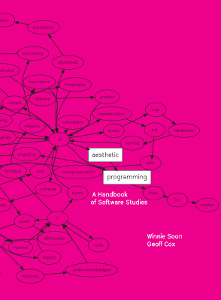Aesthetic Programming: A Handbook of Software Studies - new open access book from Open Humanities Press
 Friday, February 12, 2021 at 9:07AM
Friday, February 12, 2021 at 9:07AM We are delighted to announce the publication of Aesthetic Programming: A Handbook of Software Studies by Winnie Soon and Geoff Cox.
Like all Open Humanities Press books, Aesthetic Programming is available for free:
http://www.openhumanitiespress.org/books/titles/aesthetic-programming/
 Aesthetic Programming explores the technical as well as cultural imaginaries of programming from its insides. It follows the principle that the growing importance of software requires a new kind of cultural thinking — and curriculum — that can account for, and with which to better understand the politics and aesthetics of algorithmic procedures, data processing and abstraction. It takes a particular interest in power relations that are relatively under-acknowledged in technical subjects, concerning class and capitalism, gender and sexuality, as well as race and the legacies of colonialism. This is not only related to the politics of representation but also nonrepresentation: how power differentials are implicit in code in terms of binary logic, hierarchies, naming of the attributes, and how particular worldviews are reinforced and perpetuated through computation. Using p5.js, it introduces and demonstrates the reflexive practice of aesthetic programming, engaging with learning to program as a way to understand and question existing technological objects and paradigms, and to explore the potential for reprogramming wider eco-socio-technical systems. The book itself follows this approach, and is offered as a computational object open to modification and reversioning.
Aesthetic Programming explores the technical as well as cultural imaginaries of programming from its insides. It follows the principle that the growing importance of software requires a new kind of cultural thinking — and curriculum — that can account for, and with which to better understand the politics and aesthetics of algorithmic procedures, data processing and abstraction. It takes a particular interest in power relations that are relatively under-acknowledged in technical subjects, concerning class and capitalism, gender and sexuality, as well as race and the legacies of colonialism. This is not only related to the politics of representation but also nonrepresentation: how power differentials are implicit in code in terms of binary logic, hierarchies, naming of the attributes, and how particular worldviews are reinforced and perpetuated through computation. Using p5.js, it introduces and demonstrates the reflexive practice of aesthetic programming, engaging with learning to program as a way to understand and question existing technological objects and paradigms, and to explore the potential for reprogramming wider eco-socio-technical systems. The book itself follows this approach, and is offered as a computational object open to modification and reversioning.
Web: http://aesthetic-programming.net
Repository: https://gitlab.com/aesthetic-programming/book
‘Instructive, imaginative and accessible, this is an introduction to programming like no other. Aesthetic Programming opens up the thinking in software in a vivid, critical and creative manner; it is a book full of procedural pleasures and witty algorithms that also poses a remarkable set of questions about contemporary digital life.’
- Matthew Fuller, Professor of Cultural Studies, Goldsmiths, University of London
‘Skilfully moving across the instructional, the pedagogic, and the critical, Aesthetic Programming makes an expansive contribution to computational thinking. Engaging with programming from a practice-based approach, this illuminating text demonstrates how critical aesthetics can transform programming. Recipe book, code library, poetic manual, convivial instructional, and primer to computing imaginaries all assemble into this compelling and indispensable addition to software studies.’
- Jennifer Gabrys, Chair in Media, Culture and Environment, University of Cambridge
Author Bios
Geoff Cox likes not to think of himself as an old white man from a parochial island but is clearly in denial. Thankfully other aspects of his identity are more ambiguous and fluid. Research interests lie broadly across the fields of software studies, contemporary art practice, cultural theory, and image politics, reflected in his academic position as Associate Professor and co-Director of the Centre for the Study of the Networked Image at London South Bank University, UK, and Adjunct Associate Professor, Aarhus University, DK.
Winnie Soon was born and raised in Hong Kong, increasingly aware of, and confronting, identity politics regarding its colonial legacy and postcolonial authoritarianism. As an artist-coder-researcher, she/they is interested in queering the intersections of technical and artistic practices as a feminist praxis, with works appearing in museums, galleries, festivals, distributed networks, papers and books. Researching in the areas of software studies and computational practices, she/they is currently Associate Professor at Aarhus University, Denmark.
 Gary Hall | Comments Off |
Gary Hall | Comments Off | 





